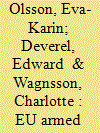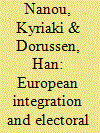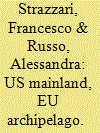|
|
|
Sort Order |
|
|
|
Items / Page
|
|
|
|
|
|
|
| Srl | Item |
| 1 |
ID:
144726


|
|
|
|
|
| Summary/Abstract |
This article explores how armed forces in EU member states work with and view social media in national and international settings, and what the patterns of convergence/divergence are on these issues. To that end, a questionnaire targeted at EU armed forces was constructed. An index of qualitative variation was calculated to explore the relative convergence among respondents (n = 25) on issues of risks and opportunities with using social media nationally and internationally. Consistent with previous research on European armed forces, we found higher levels of divergence than convergence. Contrary to our expectations that similar challenges, joint international standards, and membership in international organizations would foster convergence with regard to social media use in areas of deployment, we found that convergence appeared foremost pertaining to the domestic level. Policy divergence was strongest in areas of deployment.
|
|
|
|
|
|
|
|
|
|
|
|
|
|
|
|
| 2 |
ID:
120132


|
|
|
|
|
| Publication |
2013.
|
| Summary/Abstract |
The assignment of policy competencies to the European Union has reduced the divergence of party policy positions nationally, leaving the electorate with fewer policy options. Building upon insights from spatial proximity theories of party competition, the convergence argument predicts convergence particularly in policy domains with increasing EU competence. As the policy commitments that derive from EU membership increase, parties become more constrained in terms of the feasible policy alternative they can implement when in office. The analysis uses manifesto data at the country-party system level for nine policy domains. It uses ordinary least squares (OLS) estimation with country fixed effects, a lagged dependent variable and country corrected standard errors. Controlling for other factors that could plausibly explain policy convergence, the models also assess whether the convergent effect of party positions varies across different types of parties. The main finding is that in policy domains where the involvement of the EU has increased, the distance between parties' positions tends to decrease. The constraining impact of EU policy decisions differs between Member and non-Member States. This effect is more apparent for the policy agendas of larger, mainstream and pro-EU parties in the Member States.
|
|
|
|
|
|
|
|
|
|
|
|
|
|
|
|
| 3 |
ID:
191916


|
|
|
|
|
| Summary/Abstract |
How do states distribute the burdens of collective defense? This paper develops a network theory of burden sharing. We focus on bilateral defense cooperation agreements (DCAs), which promote cooperation in a variety of defense, military, and security issue areas. Using a computational model, we show that DCA partners’ defense spending depends on the network structure of their agreements. In bilateral terms, DCAs increase defense spending by committing states to defense activities and allowing partners to reciprocally punish free riding. However, as a state's local network of defense partnerships grows more densely connected, with many transitive “friend of a friend” relations, DCAs have the countervailing effect of reducing defense spending. The more deeply integrated states are in bilateral defense networks, the less they spend on defense. We distinguish two potential mechanisms behind this effect—one based on efficiency improvements, the other on free riding. An empirical analysis using multilevel inferential network models points more to efficiency than to free riding. Defense networks reduce defense spending, and they do so by allowing countries to produce security more efficiently.
|
|
|
|
|
|
|
|
|
|
|
|
|
|
|
|
| 4 |
ID:
145001


|
|
|
|
|
| Summary/Abstract |
This paper analyzes the process of policy convergence between the European Union (EU) and Korea with respect to regulating chemicals. Its framework for policy convergence includes international and domestic influences on why and how policy convergence occurs, what is transferred, and what risks are involved. The following findings flow from the case study analysis. First, policy convergence between Korea and the EU has occurred not only due to external factors such as diffusion and regulatory competition but also due to internal factors including concerns about competitiveness and domestic environmental and health accidents relating to chemicals. Second, policy convergence between Korea and the EU results in many similarities, but differences as well. Similarities between Act on the Registration and Evaluation of Chemicals (AREC) and the Regulation of Registration, Evaluation and Authorization of Chemicals of the EU (EU REACH) show that chemical control would be strengthened as the end result of policy convergence. On the other hand, the differences between AREC and EU REACH imply that policy from the EU was adjusted in Korea in response to domestic conditions. This policy adjustment creates risks that can weaken the original purpose of policy and possibilities that can strengthen it. Lastly, despite adjustments that weakened some components of chemical controls, policy convergence between the EU and Korea results in Korean society entering a new phase of managing chemicals for a safer society.
|
|
|
|
|
|
|
|
|
|
|
|
|
|
|
|
| 5 |
ID:
114210


|
|
|
|
|
| Publication |
2012.
|
| Summary/Abstract |
Despite different traditions, interests and perceptions characterizing North American and European approaches to homeland security, since 9/11 policy-makers across the Atlantic have formulated increasingly similar policies to deal with terrorism and other international security threats. Challenging mainstream accounts elaborated in the policy convergence literature, and drawing from sociological works in performance studies, this essay argues that the recent evolution of homeland security policies in Europe and North America can be understood as an instance of 'practical learning'. From this perspective, this outcome is the result of the acquisition on the part of European and North American policy-makers of the practical knowledge necessary to carry out the new policies, policies learned by mimicking the practices of their counterparts across the Atlantic. This argument is then applied to examine two cases of policy convergence in Europe and North America - the proposal for a 'European Passenger Name Record' system and the project of a regional 'Security Perimeter'.
|
|
|
|
|
|
|
|
|
|
|
|
|
|
|
|
| 6 |
ID:
134070


|
|
|
|
|
| Publication |
2014.
|
| Summary/Abstract |
The fight against organized crime has become a top security priority for the European Union (EU). While a new policy area is emerging, it is difficult to understand who is in lead and how the process develops. This article delves into the post-Lisbon EU security model, exploring how Washington and Brussels collaborate in combating organized crime in a context of changing definitions, actors and policies. It argues that US definitions, operational models and policies influence EU institutional thinking and policies, shifting the emphasis from prevention and rule of law to execution and intelligence. The dynamics of policy convergence and divergence on criminal matters in the transatlantic community reflect tectonic shifts in the deepest levels of thinking security in the West, affecting the moulding of a European security identity.
|
|
|
|
|
|
|
|
|
|
|
|
|
|
|
|
|
|
|
|
|